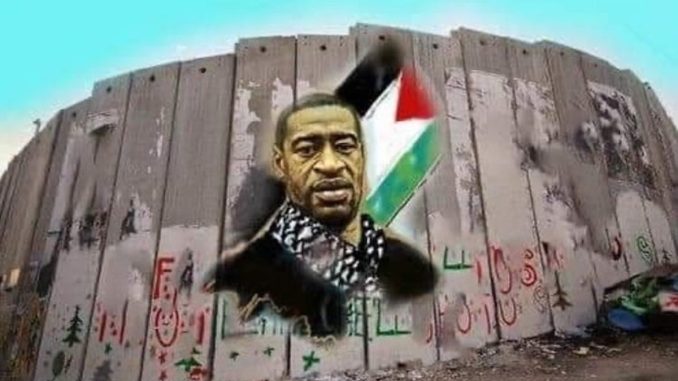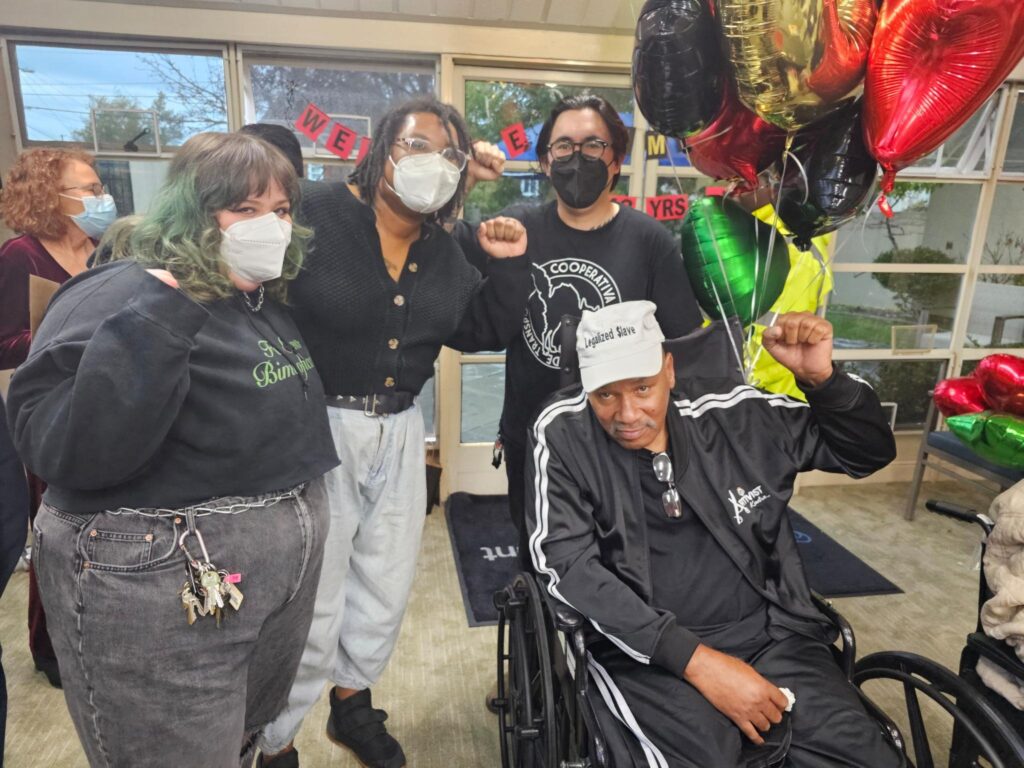Critical Resistance (CR) remains steadfast in the struggle for Black and Palestinian freedom.
This Black History Month, we at Critical Resistance uplift the ongoing legacy of the fight for Black freedom which is internationalist in practice. Alighting many people’s minds, hearts and fists is the fight for a free Palestine. We understand that the struggles for Black and Palestinian liberation are conjoined fights, with long intersecting political traditions of strong solidarity. In truth, Black people cannot be free, if Palestine is not free, and vice versa.
While countless people in the US were distracted by the Super Bowl, the Israeli government launched an assault on Rafah, where a large portion of the Palestinian population has been corralled due to the bombing campaign that’s been occurring across Gaza since October 7. The Biden administration continues to funnel billions of dollars and war materiel to the Israeli government even in the face of protest from around the country and globe. Last month, South Africa launched a case at the International Court of Justice – where the court found evidence that the Israeli government was “in danger of commiting genocide.” As US aid funds Israel’s ongoing occupation of Palestine and Syria, its military campaigns serve as a laboratory to develop weapons, surveillance technology, and tactics of population control that are then marketed across the globe. As International Jewish Anti-Zionist Network (IJAN) has pointed out in their sharp research pamphlet Israel’s Worldwide Role in Repression, “the expertise on which [Israel] relies has been developed through its occupation of Palestine and parts of Lebanon, Syria and Egypt as well as its repression of and military aggression against the people living there”–all with US-backing form billions of US taxes. We see the prioritization and investment in militarism occurring both in regards to Palestine but also in the racist US war machine deployed against Indigenous people elsewhere – particularly in Sudan – threatening genocide there as well.

As Israel develops, manufactures, markets, and exports weapons, technologies, training, and techniques of violence for use by governments and corporations against populations around the world, the Israeli government, military, and corporations work alongside a network of Zionist organizations that provide political and economic support to the state of Israel. In the US, these organizations participate in surveillance and facilitate exchanges between the Israeli military and US police forces, federal agents, and armed forces, like Urban Shield (an annual militarized police training and weapons expo that took place in the Bay Area from 2007 to 2018 until CR successfully defunded the program with the Stop Urban Shield coalition) and currently the Georgia International Law Enforcement Exchange (GILEE) program, a university-based police exchange program that focuses on “enhancing homeland security efforts through international cooperation and training programs” that is attempting to bring in the Israeli Defense Forces to become a component of Atlanta’s Cop City. In addition to a long collaboration with US-based police and military forces, Israel has played a role in arming and training the apartheid regimes of South Africa and Rhodesia, colonial regimes in the Middle East and North Africa (otherwise known as Southwest Asia and North Africa, or SWANA), and dictators in Central and South America and Asia.
As the 2024 US election (and elections around the globe) rears its head, the instability of both the political economy and the political landscape can be literally felt by the majority of everyday people. One way we are seeing this emerge is the ongoing drum beat of “tough on crime” rhetoric in response to the exacerbated “crime wave,” across the US – which – like the 1980s – has a particularly detrimental impact on Black people. Biden’s pro-police – pro-imprisonment orientation, exemplified by the notorious 94 Crime Bill, has continued to pull the political center to the right-wing on issues related to policing and imprisonment.
The capacity for PIC abolitionists to connect struggles against the PIC with a strong anti-imperialist lens is being demonstrated by organizers across the US and has been for decades. Even in the face of increasing global repression, we’re seeing beautiful solidarity with Palestine today across communities also fighting for Black liberation. Lara Kiswani, long-time CR comrade and member of CR’s community advisory board as the Executive Director of Arab Resource & Organizing Center (AROC) explained in a 2021 interview for CR’s The Abolitionist that:
“For a lot of us, Black-Palestinian solidarity didn’t recently emerge; it’s a part of how we understand Palestinian liberation. Specifically, we have an analysis of racial capitalism and liberation of Black and Indigenous people, in the US but also globally. The roots are quite deep, in terms of the dialectic between how internationalism is informed by the Palestinian movement, how the Black radical tradition is very much informed by internationalism, and how the Palestinian movement is informed by the Black radical tradition. The tenets are internationalism, anti-colonialism, anti-capitalism, a deep emphasis on base building, on grassroots organizing, and on cross-movement building locally and internationally. That is reflected in the Palestinian left, globally, in diaspora, and on the ground in Palestine. We trace it back to political prisoners in Palestine reading Angela Davis, how Malcolm X shaped and influenced the Black liberation movement in the US but also solidarity with Palestine, and how that shaped the Palestinian movement’s understanding of Black liberation.”
It is no coincidence that several of the books found in Black revolutionary leader of the radical prisoner movement George Jackson’s cell after he was assassinated by guards at San Quentin State Prison in 1971 were about the Palestinian liberation movement by a range of Palestinian authors.
Just as we saw this rich legacy of Black-Palestinian solidarity throughout the emergence of the Black Lives Matter movement in the US, from Palestinians in historic Palestine sharing tips on social media for Black and Brown folks in the US standing off against cops in riot gear to protect each other from military equipment to again taking to the streets together in calling for wide demands to defund policing globally during the 2020 George Floyd rebellions, now the struggle to Stop Cop City remains vibrant in this approach. Even as policing proponents push for numerous Cop City projects in various cities across the country as a rollback to the wins of the 2020 rebellions, we are seeing Black-led struggles for resistance making concrete political and economic connections between the premature death-making police regime in the US and the zionist genocide of Palestine.
As an organization formed in part from the rich tradition of Black-Palestinian solidarity historically, CR has been rising up in support of the fight for Palestine. Whether connecting the link between the work to free Palestine and to abolish the PIC or co-anchoring mobilizations, CR members across the country have been working at the intersection of PIC abolition and Palestinian liberation.

CR has done so while also continuing our ongoing campaign and project work through our chapters. This has included work to close 10 prisons across the state of California, a state that, like many, disproportionately polices and imprisons Black people. In New York state, the fight against incarcerating migrants continues via our Dignity Not Detention work, in the midst of NYC disproportionately targeting of Black and African migrants. CR recently released Issue 40 of the Abolitionist Newspaper on Control Units – uplifting in particular, the fight against solitary confinement exemplified by the 2011 and 2013 California Prisoner Hunger Strikes out of Pelican Bay prison initiated by the Short Corridor Collective, a multi-racial group of prisoners in solitary confinement at the time, whose courage and strategy inspired over 30,000 imprisoned people across the state to join them in their strike. The legacy of that victory continues with the recent release of our comrade, Sitawa Nantambu Jamaa, a member of the Short Corridor Collective, who co-led the Hunger Strikes. CR welcomes Sitawa home and asks our friends, comrades, networks, and communities to join us in donating what you can to his coming home fund.
This Black History month, we must take heart in the tremendous displays of resistance across the globe to fortify us during the challenges of our current conditions and the uncertainty on the horizon. The fire of PIC abolition burns even in the bleakest of times. May it continue to light our way forward, keep us warm and remain strong to defeat our enemies.
Ever onward,
-Critical Resistance
